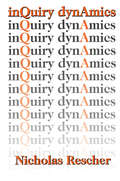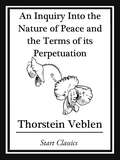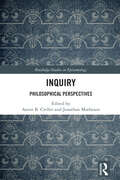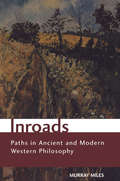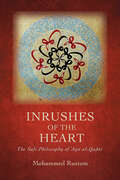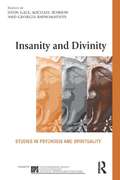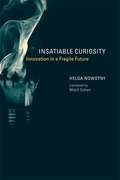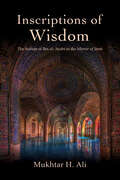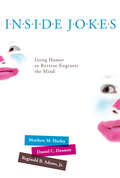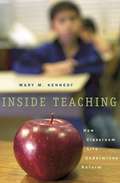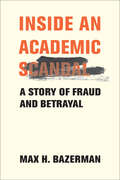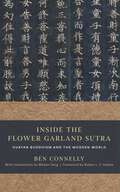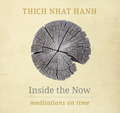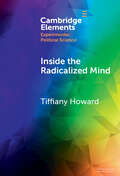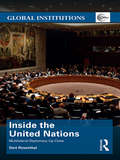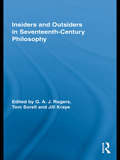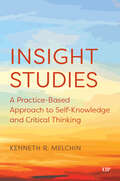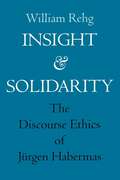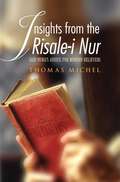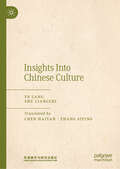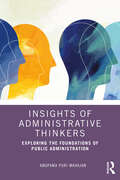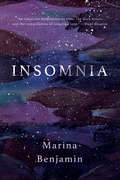- Table View
- List View
Inquiry Dynamics
by Nicholas RescherEpistemology is more than the theory of knowledge. Its range of concern includes not only knowledge proper but also rational belief, probability, plausibility, evidentiation, and not least, erotetics, the business of raising and resolving questions. Aristotle indicated that human inquiry is grounded in wonder; when matters are so out of the ordinary we puzzle about the reason why and seek for an explanation. With increasing sophistication, the ordinary as well as the extraordinary excites the intellect, so that questions gain an increasing prominence within epistemology. Inquiry Dynamics focuses on the phenomena and theory of rational inquiry, focusing on its concern for questions and their management. An introductory chapter lays the groundwork of the book's deliberations, followed by chapter 2, explaining the basic concepts involved in the abstract logic of questions and answers and sets out the generic fundamentals of the domain. Chapters 3 and 4 expound the theoretical principles that characterize the field of question epistemology in general, clarifying the fundamental themes and theses of the subject. Chapters 5 through 9 then explore the landscape of question epistemology within science. Rescher seeks to show that there are limits-restrictions of basic principle-to our ability to resolve scientific questions. The concluding chapter argues in particular that the grand goal of an ultimate theory, one resolving all explanatory questions, has to be approached with great caution. Throughout Rescher emphasizes that a question-oriented approach to the process of inquiry serves to highlight the inherent limitations of the cognitive project. Rescher's question-oriented treatment of epistemology proceeds in the tradition of Kant and stands in decided contrast to the dominant knowledge-oriented approach originating with Descartes. He demonstrates that a concern for the issue of plausible question resolution is a necessary component of the epistemological enterprise. Inquiry Dynamics will be of interest to philosophers, scientists, and social scientists.
Inquiry into the Nature of Peace and the Terms of Its Perpetuation
by Thorstein VeblenOne of the great thinkers of the early 20th century, American economist and sociologist THORSTEIN BUNDE VEBLEN (1857-1929) is best remembered for coining the phrase "conspicuous consumption." In the waning days of World War I, he turned his expertise on a pressing issue of the day: how to create a lasting, healthy peace, and how industry might contribute to it. In this 1917 book, Veblen explores... . how the concept of patriotism can undermine efforts toward peace . how modern commerce can unify nations . why honor must be sustained by surrendering nations . how war in the 20th century is a battle between modes of government and national character . and more. ALSO FROM COSIMO: Veblen's The Vested Interests and the Common Man, The Theory of Business Enterprise, and Imperial Germany and the Industrial Revolution
Inquiry: Philosophical Perspectives (Routledge Studies in Epistemology)
by Jonathan Matheson Aaron B. CrellerThis volume brings together essays from several different perspectives on a topic in epistemology that is garnering increased attention: Inquiry. It is the first volume focused solely on philosophical issues related to inquiry.Inquiry is a fundamental human practice. We have questions, and we want answers. These questions span numerous domains and range from the trivial to questions of the utmost importance. Without inquiry, and successful inquiry in particular, our fate is bleak. Inquiry is also familiar. Everyone engages in inquiry. In fact, inquiry (of some sort) is something that we engage in every day. However, while inquiry is both fundamental and familiar, only recently have epistemologists turned to focus explicitly on inquiry. The result is a growing literature concerning questions like the following: Does inquiry have an aim? If so, what is the aim of inquiry? What norms govern inquiry? How are epistemic norms and norms of inquiry related? What does inquiry look like with an epistemic division of labor? Is it ever permissible to interfere with the inquiry of another person? What is the relationship between inquiry and belief? Knowledge? Wisdom? How do bias and prejudice affect inquiry? What is the nature and role of attitudes like curiosity and wonder? Inquiry: Philosophical Perspectives builds on the existing debates surrounding these questions, advancing them, and taking them in new directions. It will appeal primarily to scholars and graduate students working in epistemology, philosophy of language, philosophy of mind, and philosophy of science.
Inroads
by Murray MilesThis unique introduction to philosophy is designed as a companion volume to a number of classic philosophical texts widely used in first- and upper-year philosophy courses. While remaining clear and readable, Inroads provides detailed analyses of fundamental issues in metaphysics and morals: the existence of God, the meaning of death, and the elements and definitions of the 'good life' for humankind.Combining a historical with a systematic approach, Murray Miles's work straddles the customary divisions between ancient and modern, and Anglo-American and continental European philosophy. In each of its five main parts - in turn, focusing on Socrates, Plato, Descartes, Hume, and Sartre - Inroads discusses, from a philosophical rather than a religious or scientific perspective, those questions that make up the common inheritance of academic philosophy and ethico-religious thought. Other features include a detailed glossary of philosophical terms, suggestions for further reading, and questions for reflection and review. Inroads is a useful text for first-year undergraduate courses or, equally, a sound resource for the general reader looking for a good grounding in philosophy and its history.
Inrushes of the Heart: The Sufi Philosophy of ʿAyn al-Quḍāt (SUNY series in Islam)
by Mohammed RustomInrushes of the Heart delves deeply into the life and thought of 'Ayn al-Quḍāt Hamadānī (d. 525/1131), a major Muslim philosopher, Sufi master, and religious judge who was executed by the Seljuq government at the age of thirty-four. Mohammed Rustom presents nearly eight hundred passages in translation (most of which appear here for the first time in English) from 'Ayn al-Quḍāt's Arabic and Persian writings alongside a step-by-step commentary that outlines every major theme that guides his worldview. Contextualizing 'Ayn al-Quḍāt's life, influence, and self-perception as a teacher and scholar extraordinaire, the book then carefully unpacks his highly original teachings on God, cosmology, human agency, spiritual practice, imagination, death, knowledge, scripture, beauty, and love.
Insanity and Divinity: Studies in Psychosis and Spirituality (The International Society for Psychological and Social Approaches to Psychosis Book Series)
by John Gale Michael Robson Georgia RapsomatiotiHow close is spirituality to psychosis? Covering the interrelation of psychosis and spirituality from a number of angles, Insanity and Divinity will generate dialogue and discussion, aid critical reflection and stimulate creative approaches to clinical work for those interested in the connections between religious studies, psychoanalysis, anthropology and hagiography. Bringing together an international range of contributors and covering many different types of religious experience, this book presents its theme in three parts: Psychoanalysis, belief and mysticism Anthropology, history and hagiography Psychology, psychosis and religious experience. Each section includes discussion of the hinterland between madness and religious experience from the perspective of a number of religions, autobiographical accounts of those who have experienced a psychosis in which spirituality played a key part and a comprehensive review of the position of psychology research into the meaning and function of spirituality in relation to the psychoses. Insightful, enlightening and wide-ranging, Insanity and Divinity is ideal for clinicians, academics and chaplains working in clinical settings.
Inscriptions of Wisdom: The Sufism of Ibn al-ʿArabī in the Mirror of Jāmī (SUNY series in Islam)
by Mukhtar H. AliTwo important texts in the Sufi tradition made available together in English for the first time.Inscriptions of Wisdom brings together, for the first time in English, two pivotal Sufi texts that illuminate Ibn al-ʿArabī's (d. 1240) celebrated work Fuṣūṣ al-ḥikam. The first, Naqsh al-Fuṣūṣ (the Inscription of the Fuṣūṣ), is Ibn al-ʿArabī's own distillation of Fuṣūṣ al-ḥikam, presenting a concise yet profound articulation of its core teachings. The second, Naqd al-nuṣūṣ fī sharḥ Naqsh al-Fuṣūṣ (texts commenting on Naqsh al-Fuṣūṣ), by ʿAbd al-Raḥmān Jāmī, is an anthology of carefully selected passages from the earliest and most authoritative interpreters of Fuṣūṣ al-ḥikam, enriched with Jāmī's own insights. Together, these works explore the quintessential knowledge and divine principles embodied by each of the twenty-seven major prophetic figures of the Islamic tradition, from Adam to Muhammad. If Fuṣūṣ al-ḥikam represents the culmination of Ibn al-ʿArabī's thought, then Naqsh al-Fuṣūṣ distills its very essence and inner mystery. Mukhtar H. Ali's meticulous presentation of the Fuṣūṣ al-ḥikam commentarial tradition—featuring the first complete English translation of Jāmī's Naqd al-nuṣūṣ, chapter-by-chapter analysis, and extensive notes on key Sufi terms and concepts—establishes this volume as a landmark study in Islamic metaphysics and Sufi thought.
Insecurity (21st Century Studies)
by Richard GrusinInvestigating insecurity as the predominant logic of life in the present moment Challenging several key concepts of the twenty-first century, including precarity, securitization, and resilience, this collection explores the concept of insecurity as a predominant logic governing recent cultural, economic, political, and social life in the West. The essays illuminate how attempts to make human and nonhuman systems secure and resilient end up having the opposite effect, making insecurity the default state of life today.Unique in its wide disciplinary breadth and variety of topics and methodological approaches—from intellectual history and cultural critique to case studies, qualitative ethnography, and personal narrative—Insecurity is written predominantly from the viewpoint of the United States. The contributors&’ analyses include the securitization of nongovernmental aid to Palestine, Bangladeshi climate refugees, and the privatization of U.S. military forces; the history of the concept of insecurity and the securitization of finance; racialized urban development in Augusta, Georgia; Amazon&’s Mechanical Turk and the consequences of the Marie Kondo method; and the intricate politics of sexual harassment in the U.S. academy.Contributors: Neel Ahuja, U of California, Santa Cruz; Aneesh Aneesh, U of Wisconsin, Milwaukee; Lisa Bhungalia, Kent State U; Jennifer Doyle, U of California, Riverside; Annie McClanahan, U of California, Irvine; Andrea Miller, Florida Atlantic U; Mark Neocleous, Brunel U London; A. Naomi Paik, U of Illinois, Chicago; Maureen Ryan, U of South Carolina; Saskia Sassen, Columbia U.
Inside Ethics: On the Demands of Moral Thought
by Alice CraryAlice Crary offers a transformative account of moral thought about human beings and animals. Instead of assuming that the world places no demands on our moral imagination, she underscores the urgency of treating the exercise of moral imagination as necessary for arriving at an adequate world-guided understanding of human beings and animals.
Inside Jokes: Using Humor to Reverse-Engineer the Mind
by Daniel C. Dennett Matthew M. Hurley Reginald B. AdamsAn evolutionary and cognitive account of the addictive mind candy that is humor.Some things are funny—jokes, puns, sitcoms, Charlie Chaplin, The Far Side, Malvolio with his yellow garters crossed—but why? Why does humor exist in the first place? Why do we spend so much of our time passing on amusing anecdotes, making wisecracks, watching The Simpsons? In Inside Jokes, Matthew Hurley, Daniel Dennett, and Reginald Adams offer an evolutionary and cognitive perspective. Humor, they propose, evolved out of a computational problem that arose when our long-ago ancestors were furnished with open-ended thinking. Mother Nature—aka natural selection—cannot just order the brain to find and fix all our time-pressured misleaps and near-misses. She has to bribe the brain with pleasure. So we find them funny. This wired-in source of pleasure has been tickled relentlessly by humorists over the centuries, and we have become addicted to the endogenous mind candy that is humor.
Inside Teaching: How Classroom Life Undermines Reform
by Mary M. KennedyReform the schools, improve teaching: these battle cries of American education have been echoing for twenty years. So why does teaching change so little? Arguing that too many would-be reformers know nothing about the conflicting demands of teaching, Mary Kennedy takes us into the controlled commotion of the classroom, revealing how painstakingly teachers plan their lessons, and how many different ways things go awry. Teachers try simultaneously to keep track of materials, time, students, and ideas. In their effort to hold all of these things together, they can inadvertently quash students' enthusiasm and miss valuable teachable moments. Kennedy argues that pedagogical reform proposals that do not acknowledge all of the things teachers need to do are bound to fail. If reformers want students to learn, they must address all of the problems teachers face, not just those that interest them.
Inside an Academic Scandal: A Story of Fraud and Betrayal
by Max H. BazermanHow fraud in a published paper about honesty roiled the world of social science.In 2012 Max Bazerman, along with four coauthors, published an influential paper showing that &“signing first&”—that is, promising to tell the truth before filling out a form—produced greater honesty than signing afterward. In 2021, academic sleuths revealed that two of the experiments in the paper were fraudulent, triggering what would become one of the most significant academic frauds of the twenty-first century.In Inside an Academic Scandal, Bazerman tells the sobering story of how fraud in a published paper about inducing honesty upended countless academic careers, wreaked havoc in organizations that had implemented the idea of &“signing first,&” and undermined faith in academic research and publication.This vivid account offers an inside look at the replicability crisis in social science today. In intriguing detail, the book explores recent conflicts and transformations underway in the field, considers the role of relationships and trust in enabling fraud in academic research, and describes Bazerman&’s own part in the scandal—what he did and didn&’t do to stop the fraud in the signing-first paper, what consequences he faced, and what hard lessons he learned in the process.A compelling story of fraud and betrayal, the book provides a deep and ultimately instructive look at how academic research works—and doesn&’t—in social science.
Inside the Flower Garland Sutra: Huayan Buddhism and the Modern World
by Ben ConnellyA Soto Zen teacher explores the core teachings of the ancient Huayan school of Buddhism through an innovative and engaging collection of essays showing how to put these teachings into practice.Huayan Buddhism arose in the sixth century and was rooted in the Mahayana Flower Garland Sutra. The teachings of Huayan had a profound influence on Chan and Zen. Huayan is relational, practical, and positive. Its emphasis on interdependence, celebration of the sensual world, and diversity of people and practices provides inspiration for what Thich Nhat Hanh called &“engaged Buddhism." With Inside the Flower Garland Sutra, Zen teacher Ben Connelly explains the significance of Huayan teachings for Buddhist practice. Each chapter is a commentary on one of the thirty lines of Uisang&’s &“Song of Dharma Nature&”—a seminal Korean text that summarizes Huayan thought—thus providing a broad overview of Huayan teachings and their practical implications for contemporary life, with a mix of testimonies from real-life situations and references to influential Buddhist texts. Arising fifteen hundred years ago, Huayan has made a deep impact on East Asian Buddhism, and has much to offer during this era when many folks see ever-deepening divisions. Connelly explores how Huayan offers particular wisdom for those concerned about how to care for their own lives as they work to end harms such as ecological devastation, poverty, militarism, addiction, marginalization, and exploitation.
Inside the Now
by Thich Nhat HanhFor the first time Thich Nhat Hanh shares his inspiration and experience of living in stillness and timelessness. Written to pull you into the experience and experience the moment as he sees it, Inside the Now offers teachings inspired by the spirit of poetry. More personal than the majority of his writing, Inside the Now shares the Zen Master's experience using poetry and meditation to endure and move beyond violence and oppression.Inspired by Being Time by Zen Master Dogen, Thich Nhat Hanh shares short meditations along with relevations from his past to give the reader a sense of entering a space of timelessness. In these meditations, he reveals his own doubts and his own searching.
Inside the Radicalized Mind: The Neuropolitics of Terrorism and Violent Extremism (Elements in Experimental Political Science)
by Tiffiany HowardThis Element aims to better understand the role of the internet in the radicalization process, focusing on how online factors contribute to self-radicalization. Specifically, it examines the neurocognitive process of online radicalization by analyzing the impact of terrorist and extremist propaganda videos on individuals' cognitive empathy using electroencephalography (EEG). Ultimately, this research aims to provide a more comprehensive understanding of online radicalization and the psychological effects of exposure to extremist content on the internet.
Inside the United Nations: Multilateral Diplomacy Up Close (Global Institutions)
by Gert RosenthalInside the United Nations illustrates some of the parameters surrounding consensus-building at the United Nations, seeking to provide new insights beyond what is already known. The author spent twelve years as P.R of Guatemala at the UN, offering him privileged observatories in all three of the main inter-governmental organs: the General Assembly, the Economic and Social Council, and the Security Council. In this book Rosenthal focuses on six case studies that offer the breadth and scope of what the UN does, and illustrate some of the main elements of the dynamics of consensus-building, providing concrete examples of the ingredients that shape decision-making in a multilateral setting. The chapters: cover the origin, preparation, and outcome of two successful international conferences: the 2000 Millennium Summit and the 2002 International Conference on Financing for Development; look at the 2000 negotiation on the scale of assessments to finance the UN’s budget in the General Assembly’s fifth committee (2000-2001); focus on the relevance of the Economic and Social Council; consider the internal politics involved in vying for elected posts in intergovernmental bodies by focusing on the campaign to be elected to the Security Council between Guatemala and Venezuela in 2006; reflect on the peculiarities of decision-making in the Security Council. Providing an insider’s view on the UN and exploring different facets of multilateral diplomacy at the UN, this book will be of great use and interest to scholars of international relations as well as the diplomatic community.
Insiders and Outsiders in Seventeenth-Century Philosophy (Routledge Studies in Seventeenth-Century Philosophy)
by Tom Sorell Jill Kraye G. A. J. RogersSeventeenth-century philosophy scholars come together in this volume to address the Insiders--Descartes, Spinoza, Leibniz, Locke, and Hobbes--and Outsiders--Pierre Gassendi, Kenelm Digby, Theophilus Gale, Ralph Cudworth and Nicholas Malebranche--of the philosocial canon, and the ways in which reputations are created and confirmed. In their own day, these ten figures were all considered to be thinkers of substantial repute, and it took some time for the Insiders to come to be regarded as major and original philosophers. Today these Insiders all feature in the syllabi of most history of philosophy courses taught in western universities, and the papers in this collection, contrasting the stories of their receptions with those of the Outsiders, give an insight into the history of philosophy which is generally overlooked.
Insight
by Robert M. Doran SJ Bernard Lonergan Frederick E. Crowe, S.J.Insight is Bernard Lonergan's masterwork. It aim is nothing less than insight into insight itself, a comprehensive view of knowledge and understanding, and to state what one needs to understand and how one proceeds to understand it.In Lonergan's own words: 'Thoroughly understand what it is to understand, and not only will you understand the broad lines of all there is to be understood but also you will possess a fixed base, and invariant pattern, opening upon all further developments of understanding.'The editors of the Collected Works of Bernard Lonergan have established the definitive text for Insight after examining all the variant forms in Lonergan's manuscripts and papers. The volume includes introductory material and annotation to enable the reader to appreciate more fully this challenging work.Bernard Lonergan (1904-1984), a professor of theology, taught at Regis College, Harvard University, and Boston College. An established author known for his Insight and Method in Theology, Lonergan received numerous honorary doctorates, was a Companion of the Order of Canada in 1971 and was named as an original members of the International Theological Commission by Pope Paul VI.
Insight Studies: A Practice-Based Approach to Self-Knowledge and Critical Thinking
by Kenneth MelchinInsight Studies emphasizes the importance of understanding the operations that generate and verify the knowledge we rely on in our daily lives. Grounded in the philosophy of Bernard Lonergan, the book employs a practice-based approach similar to learning a musical instrument, fostering critical thinking skills through engaging learning modules. The book features modules that include puzzles with detailed instructions to help learners focus on their own cognitive processes and operations of knowing. This approach broadens the scope of critical thinking to encompass the operations of questioning, understanding, verifying, valuing, and cooperating. Each chapter illustrates the relevance of these skills across various fields, including ethics, conflict resolution, psychology, sociology, philosophy, politics, and personal relationships. Structured as a nine-module course text, Insight Studies can be adapted for in-class, online, or self-directed learning. Designed to be learner friendly, this book equips readers with transformative skills that are applicable to everyday life.
Insight and Solidarity: The Discourse Ethics of Jürgen Habermas (Philosophy, Social Theory, and the Rule of Law #1)
by William RehgDiscourse ethics represents an exciting new development in neo-Kantian moral theory. William Rehg offers an insightful introduction to its complex theorization by its major proponent, Jürgen Habermas, and demonstrates how discourse ethics allows one to overcome the principal criticisms that have been leveled against neo-Kantianism.Addressing both "commun-itarian" critics who argue that universalist conceptions of justice sever moral deliberation from community traditions, and feminist advocates of the "ethics of care" who stress the moral significance of caring for other individuals, Rehg shows that discourse ethics combines impartiality with solidarity. He provides the first systematic reconstruction of Habermas's theory and explores its relationship to the work of such contemporary philosophers as Charles Taylor. His book articulates a bold alternative to the split between the "right" and the "good" in moral theory and will greatly interest philosophers, social and legal scholars, and political theorists.
Insights from the Risale-i Nur: Said Nursi's Advice for Modern Believers
by Thomas MichelThis collection of essays written by Thomas Michel offers an insightful and comparative analysis into the life, thoughts and major writings of Said Nursi. It provides insight into a deep conversation taking place between a Catholic priest and a Muslim theologian. This sincere and humble collection of essays will be an indispensable reading for believers of all faiths and backgrounds with an interest in social and contemporary issues. Michel remarks that Nursi called for unity and cooperation between the Muslim-Christian communities fifty years before the Vatican II called upon Christians and Muslims to recognize that they should move beyond the conflicts of the past and work together for the common good to build peace, establish social justice, defend moral values, and promote true human freedom.
Insights into Chinese Culture
by Ye Lang Zhu LiangzhiHighlighting the pinnacle achievements of Chinese culture, this book presents the authors’ profound insights into the concepts and passions that have shaped the Chinese nation over the past 5,000 years. By exploring this rich historical legacy of remarkable creativity and innovative spirit, still evident today in living masterpieces of art, architecture and fascinating folk traditions, readers will gain a deeper understanding of the cultural identity, worldview, aesthetic pursuits, and national spirit of the Chinese people.
Insights of Administrative Thinkers: Exploring the Foundations of Public Administration
by Anupama Puri MahajanThis book offers a lucid and comprehensive account of the contributions of eminent theorists to the study of public administration and management. It introduces its readers to the works of 32 esteemed thinkers in the field of administrative theories. It provides life sketches of all the thinkers along with an outline of their contributions and a critical discussion of their seminal work.With a focused emphasis on individual thinkers, this volume covers all the major administrative theories that have evolved over the last 600 years, such as the oriental, classical, and administrative schools of thought, organisational humanism, and public choice theories of administration. The impact of postmodernism, poststructuralism and critical social theory on public administration has also been analysed in the context of their relevance to the modern world.Written as per the prescribed curriculum, the book will serve as a helpful companion for undergraduate and postgraduate students of public administration and political science. It will be useful to students, researchers and teachers of public administration, public policy, political science, and management. The book will also be an invaluable companion to policymakers in the government sector as it will strengthen their conceptual understanding of the subject.
Insomnia
by Marina Benjamin“An insomniac’s ideal sleep aid—and that’s a compliment. With her collage of ruminations about sleeplessness, [Benjamin] promises no real cure . . . Her slim book is what the doctor ordered.”—The Atlantic Insomnia is on the rise. Villainous and unforgiving, it’s the enemy o f energy and focus, the thief of our repose. But can insomnia be an ally, too, a validator of the present moment, of edginess and creativity? Marina Benjamin takes on her personal experience of the condition—her struggles with it, her insomniac highs, and her dawning awareness that states of sleeplessness grant us valuable insights into the workings of our unconscious minds. Although insomnia is rarely entirely welcome, Benjamin treats it less as an affliction than as an encounter that she engages with and plumbs. She adds new dimensions to both our understanding of sleep (and going without it) and of night, and how we perceive darkness. Along the way, Insomnia trips through illuminating material from literature, art, philosophy, psychology, pop culture, and more. Benjamin pays particular attention to the relationship between women and sleep—Penelope up all night, unraveling her day’s weaving for Odysseus; the Pre–Raphaelite artists’ depictions of deeply sleeping women; and the worries that keep contemporary females awake. Insomnia is an intense, lyrical, witty, and humane exploration of a state we too often consider only superficially. “This is the song of insomnia, and I shall sing it,” Marina Benjamin declares.
